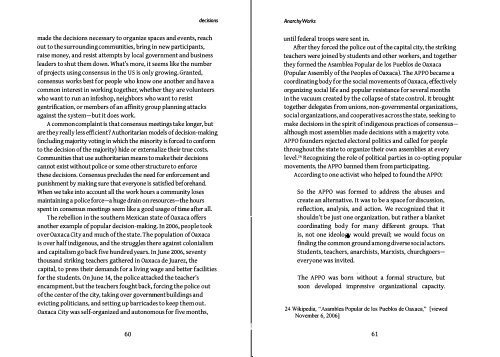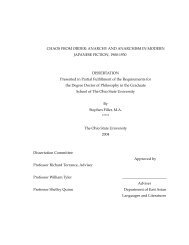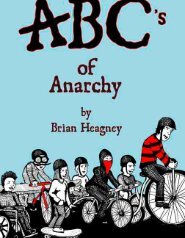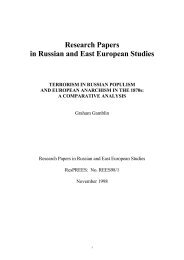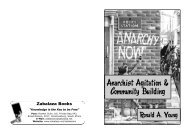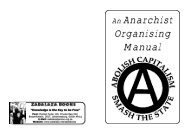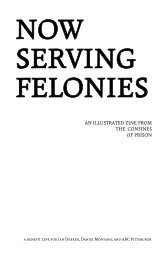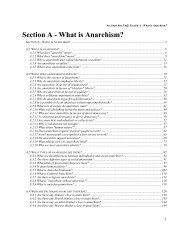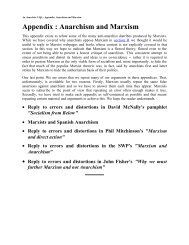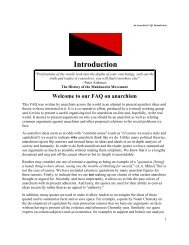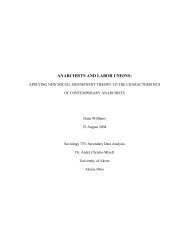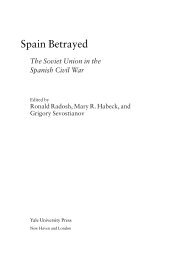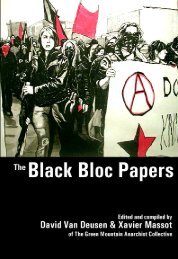Anarchy Works.pdf - Infoshop.org
Anarchy Works.pdf - Infoshop.org
Anarchy Works.pdf - Infoshop.org
You also want an ePaper? Increase the reach of your titles
YUMPU automatically turns print PDFs into web optimized ePapers that Google loves.
decisions<br />
<strong>Anarchy</strong> <strong>Works</strong><br />
made the decisions necessary to <strong>org</strong>anize spaces and events, reach<br />
out to the surrounding communities, bring in new participants,<br />
raise money, and resist attempts by local government and business<br />
leaders to shut them down. What's more, it seems like the number<br />
of projects using consensus in the us is only growing. Granted,<br />
consensus works best for people who know one another and have a<br />
common interest in working together, whether they are volunteers<br />
who want to run an infoshop, neighbors who want to resist<br />
gentrification, or members of an affinity group planning attacks<br />
against the system-but it does work.<br />
A common complaint is that consensus meetings take longer, but<br />
are they really less efficient? Authoritarian models of decision-making<br />
(including majority voting in which the minority is forced to conform<br />
to the decision of the majority) hide or externalize their true costs.<br />
Communities that use authoritarian means to make their decisions<br />
cannot exist without police or some other structure to enforce<br />
these decisions. Consensus precludes the need for enforcement and<br />
punishment by making sure that everyone is satisfied beforehand.<br />
When we take into account all the work hours a community loses<br />
maintaining a police force-a huge drain on resources-the hours<br />
spent in consensus meetings seem like a good usage of time after all.<br />
The rebellion in the southern Mexican state of Oaxaca offers<br />
another example of popular decision-making. In 2006, people took<br />
over Oaxaca City and much of the state. The population of Oaxaca<br />
is over half indigenous, and the struggles there against colonialism<br />
and capitalism go back five hundred years. In June 2006, seventy<br />
thousand striking teachers gathered in Oaxaca de Juarez, the<br />
capital, to press their demands for a living wage and better facilities<br />
for the students. On June 14, the police attacked the teacher's<br />
encampment, but the teachers fought back, forcing the police out<br />
of the center of the city, taking over government buildings and<br />
evicting politicians, and setting up barricades to keep them out.<br />
Oaxaca City was self-<strong>org</strong>anized and autonomous for five months,<br />
until federal troops were sent in.<br />
After they forced the police out of the capital city, the striking<br />
teachers were joined by students and other workers, and together<br />
they formed the Asamblea Popular de los Pueblos de Oaxaca<br />
(Popular Assembly of the Peoples of Oaxaca). The APPO became a<br />
coordinating body for the social movements of Oaxaca, effectively<br />
<strong>org</strong>anizing social life and popular resistance for several months<br />
in the vacuum created by the collapse of state control. It brought<br />
together delegates from unions, non-governmental <strong>org</strong>anizations,<br />
social <strong>org</strong>anizations, and cooperatives across the state, seeking to<br />
make decisions in the spirit of indigenous practices of consensusalthough<br />
most assemblies made decisions with a majority vote.<br />
APPO founders rejected electoral politics and called for people<br />
throughout the state to <strong>org</strong>anize their own assemblies at every<br />
level." Recognizing the role of political parties in co-opting popular<br />
movements, the APPO banned them from participating.<br />
According to one activist who helped to found the APPO:<br />
So the APPO was formed to address the abuses and<br />
create an alternative. It was to be a space for discussion,<br />
reflection, analysis, and action. We recognized that it<br />
shouldn't be just one <strong>org</strong>anization, but rather a blanket<br />
coordinating body for many different groups. That<br />
is, not one ideology would prevail; we would focus on<br />
finding the common ground among diverse social actors.<br />
Students, teachers, anarchists, Marxists, churchgoerseveryone<br />
was invited.<br />
The APPO was born without a formal structure, but<br />
soon developed impressive <strong>org</strong>anizational capacity.<br />
24 Wikipedia, "Asamblea Popular de los Pueblos de Oaxaca, [viewed<br />
November 6, 2006]<br />
60<br />
61


